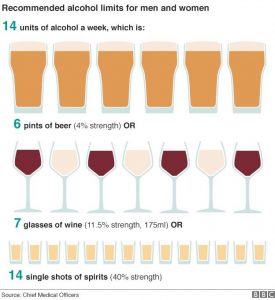Dry January
Posted by Phil Heler on January 24, 2020People who don't drink in Dry January ultimately drink less come August.
There is one well-known campaign in January that we haven’t mentioned yet. That is ‘Dry January’. In the UK, the idea and the official name has been around for only a few years. Alcohol Concern, now Alcohol Change UK, registered it as a trademark in mid-2014. The following January, the government ran an ad campaign endorsing the event.
There are other charities that hold similar fundraising events, such as Cancer Research UK’s ‘Dryathlon’ (also in January) and Macmillan’s ‘Go Sober for October’. Generally, of course the idea of a sober January has traction in the aftermath of Christmas excess.
How Much Alcohol do we Drink in the UK?
In terms of alcohol consumption, according to the WHO, the UK has the 16th highest alcohol intake per capita in the world. This equates to an average of 13 litres of pure alcohol a year per person–equivalent to nearly 500 pints of beer for each of us! Beer accounts for almost half (43 per cent) of the alcohol drunk in the country, with a third (30 per cent) wine and a fifth (21 per cent) spirits.
However, separate figures that strip out those of us who don’t drink (14.4 per cent of Britons) show that drinkers then consume an adjusted average of 15.6 litres of pure alcohol.
Ethanol is obviously pure alcohol, but this is somewhat confusing and there is no clear consensus of agreement internationally regarding how much ethanol each unit of alcohol contains. So be careful when you go abroad as this varies by almost 250%!
In the UK, 1 unit is equal to 8 grams of pure alcohol (or 10 millilitres of pure ethanol). This takes approximately an hour for the average adult to process in the body; although there are many varying factors which mean all drinkers process alcohol differently. However, in Switzerland a unit is set at between 10-12g of pure alcohol and Austria a unit comprises 20g!
The principle of cleansing after a boozy Christmas isn’t new. In 1942, Finland instigated a programme called ‘Raitis tammikuu’ (Sober January) to help aid the war effort against the then Soviet Union. According to YouGov, a UK international internet-based market research and data analytics company, in 2019 an estimated 4.2 million people in the UK signed up for Dry January. That is roughly one in ten people who drink!
Alcohol Change UK undertook a survey for those people who participated in 2017. According the data that this generated 88% of participants saved money and 58% lost weight. When 800 participants were surveyed in August later that year their average drinking days per week dropped from 4.3 to 3.3 days per week, units consumed per drinking day had dropped from 8.8 to 7.1 and the frequency of drunken moments had dropped from 3.4 per month to 2.1! Last year I wrote an article on the largest ever study into alcohol consumption levels worldwide.
So what are some of the benefits of Dry January?
1. Saving Money
Obviously if we give up booze for Dry January, we do save money. The average person spends £50,000 on alcohol in their lifetime. According to the Office of National Statistics, the average UK household spends roughly £868 on alcohol each year, based on an average household size of 2.4 people—£452 for consumption at home and £416 on drinks out of the house.
Not surprisingly, younger people spend more of their total alcohol budgets on drinks out of the house (59%) than at home (41%); the under-30 age group spends £15.20 per week on alcohol in total, or £790 per year. The 50 to 64-year-old age group spends the most on alcohol—£19.90 per week or £1,035 per year. As people age, they drink at home more often. Those aged 75 or older spend 68% of their alcohol budgets on drinks at home.
It’s clear, then, that Dry January keeps more money in your pockets no matter what age you are.
2. Lowering Calorie Intake
Considering a pint of beer contains 215 calories (at 5% alcohol), and a glass of wine includes 126 (at 12%), giving up on alcohol for 4 weeks can make a noticeable impact on your weight. Our relationship with alcohol in the UK is one of slow declining consumption, and perhaps Dry January is a symbol of our changing attitudes.
Data gathered from the NHS suggests that between 2005 and 2017 in the UK, there was a fall in the proportion of men who were frequent drinkers (those who drank alcohol on at least five days in the week) from 22% to 12%, and in the proportion of women who did so from 13% to 8%.
In 2017 in England, 24% of men said that their average weekly alcohol consumption was more than 14 units but no more than 50 units. 11% of women said that their average weekly alcohol consumption was more than 14 units but no more than 35 units.
The latest amended advice on alcohol of course states that both men and women should not consume more than 14 units per week (6 pints or 7 glasses of wine at 11.5% at 175ml). According to the NHS, bearing in mind that alcoholic drinks comprise fermented starch and sugar (this ferments to ethanol), the average wine drinker in the UK consumes roughly 2000 calories a month and five pints of lager a week correlate to 44,200 calories a year or, as it unambiguously estimates, roughly 221 doughnuts!
3. Dry January Improves Your Health
Giving up alcohol for Dry January can even improve your health in other ways apart from losing weight. Researchers at University College London ran a study on Dry January participants. The British Medical Journal published their findings in February 2016. They examined 94 moderate drinkers over the course of January as they cut their alcohol consumption.
After 30 days, the subjects’ insulin resistance improved, along with “weight, blood pressure, and cancer-related growth factors”, according to the conclusion of the study. The study’s lead researcher, Dr Gautam Mehta also stated; “We found striking benefits from a month of abstinence, in these otherwise healthy volunteers. The change in insulin resistance in particular was large, around 25% of our participants also felt a lot better, in terms of sleep and concentration. It allowed them to reset their relationship with alcohol. Six months later, the proportion of drinking at harmful levels had decrease by over 50%.”
What we do know is that alcohol damages our bodies. The main problem with alcohol, in terms of our physiology, is that when we digest it, we break it down to acetaldehyde, which is a toxic chemical and a known human carcinogen. Acetaldehyde can damage both DNA and proteins, this in turn generates what we call reactive oxygen species (chemically reactive molecules that contain oxygen), which can cause further damage to yet more DNA, other proteins, and cell membranes in the body through a process called oxidation. This is well supported by research.
4. Alcohol Decreases Your Life Expectancy
Last year I wrote about the largest ever scientific study that was without doubt the most comprehensive piece of best quality research ever published on alcohol consumption. It appeared in the The Lancet in September 2018. One commentator suggested it was “most sophisticated global study of the impact of alcohol on human health ever conducted.” This impressive study analysed a huge amount of high-quality data.
This study was so comprehensive that it comprised a collaboration of 120 researchers worldwide, from regions including Australia, Europe, Japan, the UK and the US. One key aspect of the study was that it followed the lives of almost 600,000 drinkers. Of this number, people who drank more than 12.5 units (100g) of alcohol a week were likely to die sooner than those who drank no more than this amount.
The researchers estimated that life would be shortened by an average of 1.3 years for women and 1.6 years for men for people aged 40 who drank above the UK weekly limit in comparison with those drinking below the limit. The study also looked at the likelihood of having a range of non-fatal, but potentially life-changing, cardiovascular conditions, including heart attacks, heart failure and stroke.
Drinking more alcohol was linked to higher chances of all cardiovascular conditions except heart attacks, where it was linked to a lower chance. However, greater risks from other causes of death outweighed any advantage that might bring. This high-quality study provides further evidence to support the current UK guidelines advising people to drink no more than 14 units a week.



